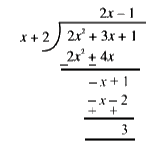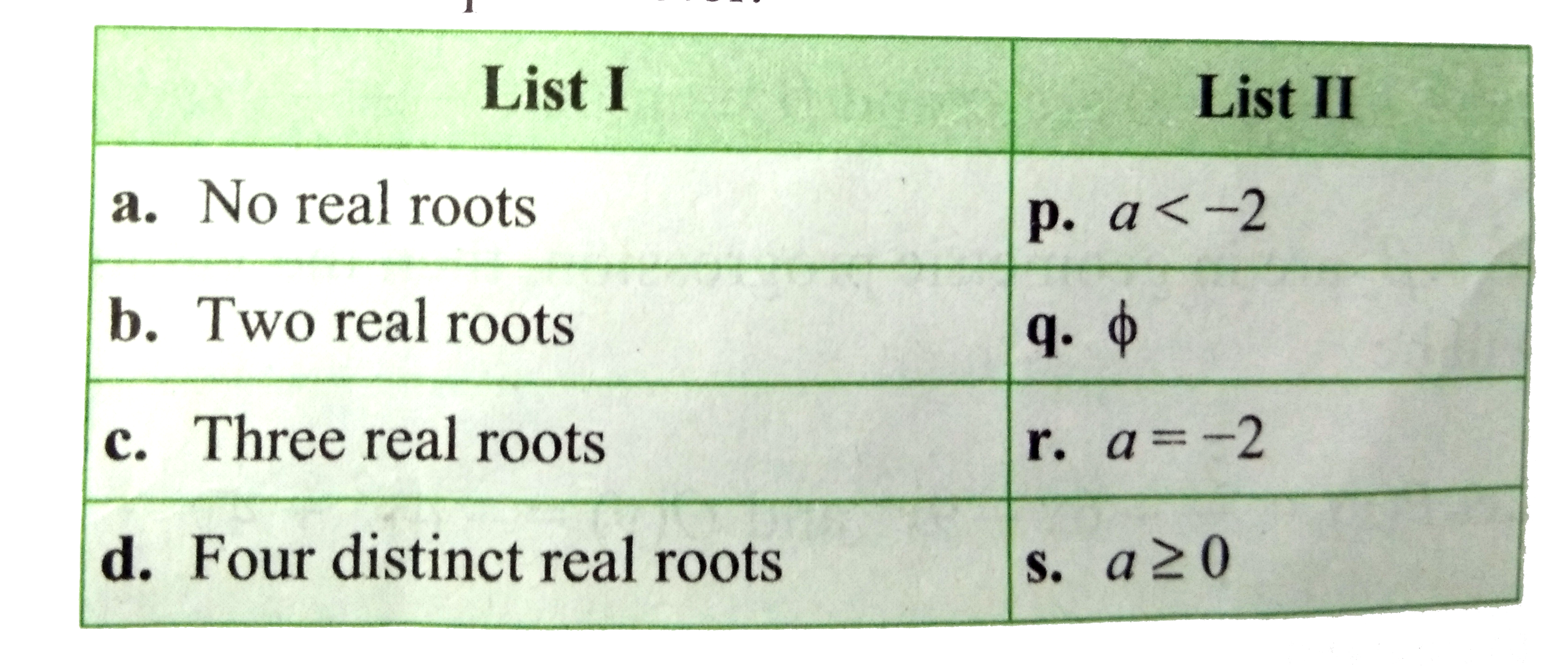Consider the equaiton 2+∣∣x2+4x+3∣∣=m,m∈R Set of all real values of m so that the given equation has three solution is Option 1: 3 Option 2: 2 Option 3: 1 Option 4: 0Solution in Tamil
{3}
{2}
{1}
{0}
The correct Answer is:1
Given equations is 2+∣∣x2+4x+3∣∣=m
∴∣∣x2+4x+3∣∣=m−2
Given equation is meaningful if m≥2 (1)
∴x2+4x+3=±(m−2)
∴x2+4x+5−m=0orx2+4x+1+m=0
∴x=−4±√16−4(5−m)2orx=−4±√16−4(1+m)2
∴x=−2±√m−1orx=−2±√3−m
For four distinct solutions m−1≥0 and 3−m≥0
∴m∈(2,3) [Using (1)]
For two solutions m−1≥0and3−m≤0⇒m≤0⇒m≥3
or m−1≤0and3−m≤0, not possible
or m=2 [Using (1)]
∴m∈{2}∪(3,∞)
Form three solutions, exactly one equation must given equal roots.
∴m=1and3−m≥0⇒ no values of m (as m≥2)
or m=3andm≥1⇒m=3
Alternate method:
Let us draw the graph of f(x)=∣∣x2+4x+3∣∣

Now equations is |(x+1)(x+3)|=m−2
From the graph.
(1) for three solution m−2=1⇒m=3
(2) for four solutions
0<m−2<1⇒2<m<3
(3) for only tow solutions
m−2=0orn−>1
⇒m=2orm>3
Topper's Solved these Questions
- THEORY OF EQUATIONSBOOK - CENGAGECHAPTER - THEORY OF EQUATIONSEXERCISE - Exercise (Matrix)
6 Videos
- THEORY OF EQUATIONSBOOK - CENGAGECHAPTER - THEORY OF EQUATIONSEXERCISE - Exercise (Numerical)
43 Videos
- THEORY OF EQUATIONSBOOK - CENGAGECHAPTER - THEORY OF EQUATIONSEXERCISE - Exercise (Multiple)
38 Videos
- STRAIGHT LINESBOOK - CENGAGECHAPTER - STRAIGHT LINESEXERCISE - JEE Advanced Previous Year
4 Videos
- THREE DIMENSIONAL GEOMETRYBOOK - CENGAGECHAPTER - THREE DIMENSIONAL GEOMETRYEXERCISE - Question Bank
12 Videos
Similar Questions
Match the following for the equation x2+a|x|+1=0 where, a is a parameter.

View SolutionIf x=2+223+213, then the value of x3−6x2+6x is:
View Solutionif c≠0 and the equation p2x=ax+c+bx−c has two equal roots, then p can be
View Solutionabout to only mathematics
View SolutionThe equation of the plane which has the property that the point Q(5,4,5) is the reflection of point P(1,2,3) through that plane, is ax+by+cz=d where a,b,c,d∈N. Find the least value of (a+b+c+d).
View SolutionConsider the equation (x^2 + x + 1)^2-(m-3)(x^2 + x + 1) +m=(1), where m is a real parameter. By putting x^2+x+1=t(2) then t >= 3/4 for real x the equation can be transferred to f(t) = t^2- (m-3)t + m=0 All the values of m for which the equation (1) will have no real roots are
View SolutionIf R is a relation on the set A={1, 2, 3} given by R=(1, 1), (2, 2), (3, 3) , then R is (a) reflexive (b) symmetric (c) transitive (d) all the three options
View SolutionFind the set of real values of 'm' for which the equation ((x)/(1+x^(2)))^(2)-(m-3)((x)/(1+x^(2)))+m=0 has real roots.
View SolutionConsdier the equaiton 2+∣∣x2+4x+3∣∣=m,m∈R Set of all real values of m so that the given equation has three solution is
View SolutionConsdier the equaiton 2+∣∣x2+4x+3∣∣=m,m∈R Set of all real values of m so that given equation have four distinct solutions, is
View SolutionConsdier the equaiton 2+∣∣x2+4x+3∣∣=m,m∈R Set of all values of m so that the given equaition have two solutions is
View SolutionConsdier the equaiton 2+∣∣x2+4x+3∣∣=m,m∈R Set of all real values of m so that given equation have four distinct solutions, is
View SolutionConsdier the equaiton 2+∣∣x2+4x+3∣∣=m,m∈R Set of all values of m so that the given equaition have two solutions is
View SolutionIf R is a relation on the set A={1, 2, 3} given by R={(1, 1), (2, 2), (3, 3)} , then R is (a) reflexive (b) symmetric (c) transitive (d) all the three options
View SolutionFind the correct option for the given question : If T = {1, 2, 3, 4, 5} and M = {3, 4, 7, 8} then T∪M= ?
View Solution
